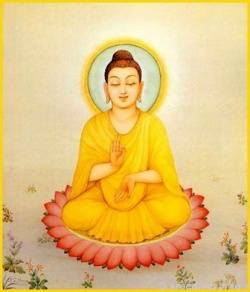Difference between revisions of "The second noble truth"
| (4 intermediate revisions by the same user not shown) | |||
| Line 1: | Line 1: | ||
[[File:Boo30tbb.jpg|thumb|250px|]] | [[File:Boo30tbb.jpg|thumb|250px|]] | ||
| − | + | 2. [[Second Noble Truth]] : | |
| + | <poem> | ||
| + | [[Noble Truth of the Cause of Suffering]] - to be eradicated | ||
| + | ([[Dukkha-samudaya-ariya-sacca]]) | ||
| − | + | [[Craving]] ([[Tanha]]) : | |
| − | + | [[Sensual Craving]] ([[Kama-tanha]]) | |
| + | [[Craving]] for Eternal [[Existence]] ([[Bhava-tanha]]) | ||
| + | [[Craving]] for Self-Annihilation ([[Vibhava-tanha]]) | ||
| + | </poem> | ||
| − | |||
| − | + | What is the [[Noble Truth of the Origin of Suffering]]? | |
| − | [[[ | + | It is [[Craving]] which renews being and is accompanied by relish and [[lust]], relishing this and that: in other words, [[Craving]] for {{Wiki|sensual}} [[desires]], [[Craving]] for being, [[Craving]] for [[non-being]]. |
| − | + | But whereon does this [[Craving]] arise and flourish? | |
| − | The [[Second[Noble Truth]] states that there is an origin of | + | Wherever there is what seems lovable and gratifying, thereon it arises and flourishes. |
| + | |||
| + | There is this [[Noble Truth of the Origin of Suffering]]:such was the [[vision]], [[Insight]], [[Wisdom]], [[knowing]] and [[Light]] that arose in me about things not heard before. | ||
| + | |||
| + | This [[Noble Truth]] must be penetrated to by [[abandoning]] the [[origin of Suffering]].... | ||
| + | |||
| + | This [[Noble Truth]] has been penetrated to by [[abandoning]] the origin of [[Suffering]]: such was the [[vision]], [[Insight Wisdom]], [[knowing]] and [[Light]] that arose in me about things not heard before. | ||
| + | |||
| + | |||
| + | [[Samyutta Nikaya]] LVI, 11] | ||
| + | |||
| + | |||
| + | The [[Second Noble Truth]] with its three aspects is: ‘There is the origin of [[Suffering]], which is [[Attachment to desire]]. [[Desire]] should be let go of. [[Desire]] has been let go of.’ | ||
| + | |||
| + | The [[Second[Noble Truth]] states that there is an [[origin of Suffering]] and that the origin of [[Suffering is Attachment]] to the three kinds of [[desire]]: | ||
| + | |||
| + | |||
| + | [[desire for sense pleasure]] ([[Kama Tanha]]), | ||
| + | |||
| + | [[desire to become]] ([[Bhava Tanha]]) and | ||
| + | |||
| + | [[desire to get rid of]] ([[vibhava Tanha]]). | ||
| + | |||
| + | |||
| + | This is the statement of the [[Second Noble Truth]], the {{Wiki|thesis}}, the [[pariyatti]]. | ||
| + | |||
| + | This is what you [[contemplate]]: the origin of [[Suffering]] is [[Attachment to desire]]. | ||
{{R}} | {{R}} | ||
[http://www.buddhanet.net/4noble11.htm www.buddhanet.net] | [http://www.buddhanet.net/4noble11.htm www.buddhanet.net] | ||
[[Category:Buddhist Terms]] | [[Category:Buddhist Terms]] | ||
[[Category:The second noble truth]] | [[Category:The second noble truth]] | ||
Latest revision as of 04:16, 27 September 2015
2. Second Noble Truth :
Noble Truth of the Cause of Suffering - to be eradicated
(Dukkha-samudaya-ariya-sacca)
Craving (Tanha) :
Sensual Craving (Kama-tanha)
Craving for Eternal Existence (Bhava-tanha)
Craving for Self-Annihilation (Vibhava-tanha)
What is the Noble Truth of the Origin of Suffering?
It is Craving which renews being and is accompanied by relish and lust, relishing this and that: in other words, Craving for sensual desires, Craving for being, Craving for non-being.
But whereon does this Craving arise and flourish?
Wherever there is what seems lovable and gratifying, thereon it arises and flourishes.
There is this Noble Truth of the Origin of Suffering:such was the vision, Insight, Wisdom, knowing and Light that arose in me about things not heard before.
This Noble Truth must be penetrated to by abandoning the origin of Suffering....
This Noble Truth has been penetrated to by abandoning the origin of Suffering: such was the vision, Insight Wisdom, knowing and Light that arose in me about things not heard before.
Samyutta Nikaya LVI, 11]
The Second Noble Truth with its three aspects is: ‘There is the origin of Suffering, which is Attachment to desire. Desire should be let go of. Desire has been let go of.’
The [[Second[Noble Truth]] states that there is an origin of Suffering and that the origin of Suffering is Attachment to the three kinds of desire:
desire for sense pleasure (Kama Tanha),
desire to become (Bhava Tanha) and
desire to get rid of (vibhava Tanha).
This is the statement of the Second Noble Truth, the thesis, the pariyatti.
This is what you contemplate: the origin of Suffering is Attachment to desire.
